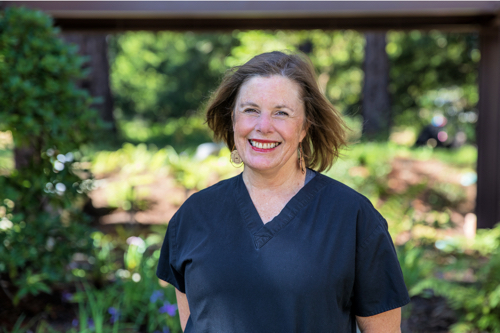Campus News
Clinic director puts off retirement to help in COVID response
Debbi Saint John played a critical role in helping to guide the campus’s COVID-19 mitigation strategies.

Debbi Saint John was all set to retire as clinic director of the UC Santa Cruz Student Health Center. She had a big party, she had the cake, she said all her goodbyes.
But it was not to be. When COVID–19 hit, all operations were disrupted, and Cowell Student Health Center Director Dr. Elizabeth Miller asked Saint John if she would consider staying on to help with the COVID response team. Saint John couldn’t say no.
“There was a need,” said Saint John, who had served as clinic director for 13 years. “I had skills, knowledge and history that would allow me to step right into the position and help. I wanted to do something to help in this global pandemic.”
Jean Marie Scott, associate vice chancellor for risk and safety services, wanted a registered nurse to be part of building COVID mitigation strategies, including figuring out records management, contact training, quarantine and isolation process and more. So that was the role Saint John filled.
One challenge was to integrate the electronic medical record with the new pandemic procedures. Saint John felt confident about helping with that as she knew the electronic medical record system very well.
Another hurdle was managing contact tracing for students. While Saint John was aware of it as a way of preventing virus spread, she had never done it before. The process involves identifying people who may have come into contact with an infected person and giving them guidance about what steps to take. Saint John and other staff members learned the procedures by enrolling in an online course offered by Johns Hopkins University.
Saint John said she gets a variety of reactions when she calls students to tell them they have been exposed to the virus. Some are expecting her call and others are shocked. Most are receptive to what she has to say. She starts out by reassuring them of the purpose of her call, saying: “You’re not in trouble. This is a safety issue. We’re helping each other.”
Saint John said she is awe of the job campus housing has done setting up quarantine and isolation units for students, including setting up food deliveries. The dining service delivers food to the student’s door if the student is on campus and Slug Support helps figure out food deliveries if the student lives off campus.
Isolation housing (for students who have COVID–19) is particularly difficult as students must have their own bathroom. “It’s depressing,” Saint John said. “You’re sick and alone in this place.”
Fortunately, the university’s case managers are all licensed marriage-family therapists or clinical social workers and are able to help with the emotional needs of the situation. Students in quarantine or isolation are assigned quarantine buddies to regularly check in on them.
Saint John is impressed at how well the campus community has adapted to the new COVID–19 mitigation measures, such mask mandates. People weren’t used to masks or social distancing but most were willing to adopt these measures. “People really understood what needed to happen and they said ‘We’re going to do this, we’re all going to step through and do this,’” said Sant John. “This is amazing and beautiful.”
She gives particular praise to university staff who completely changed jobs on a dime and stepped into new roles. She cited the Student Health Services staff, including nurses, clinicians, receptionists, lab and pharmacy personnel, who continued to come to campus and provide-in-person care during the hole pandemic. “It’s a testament to all the people here,” she said.
While it might have been easier for her to just retire and not adapt to the changing university world of the pandemic, Saint John has no regrets about her decision. “If I had retired, I might have gone crazy,” she said with a laugh. She said that as long as she is providing real help, she loves continuing to work at the university.